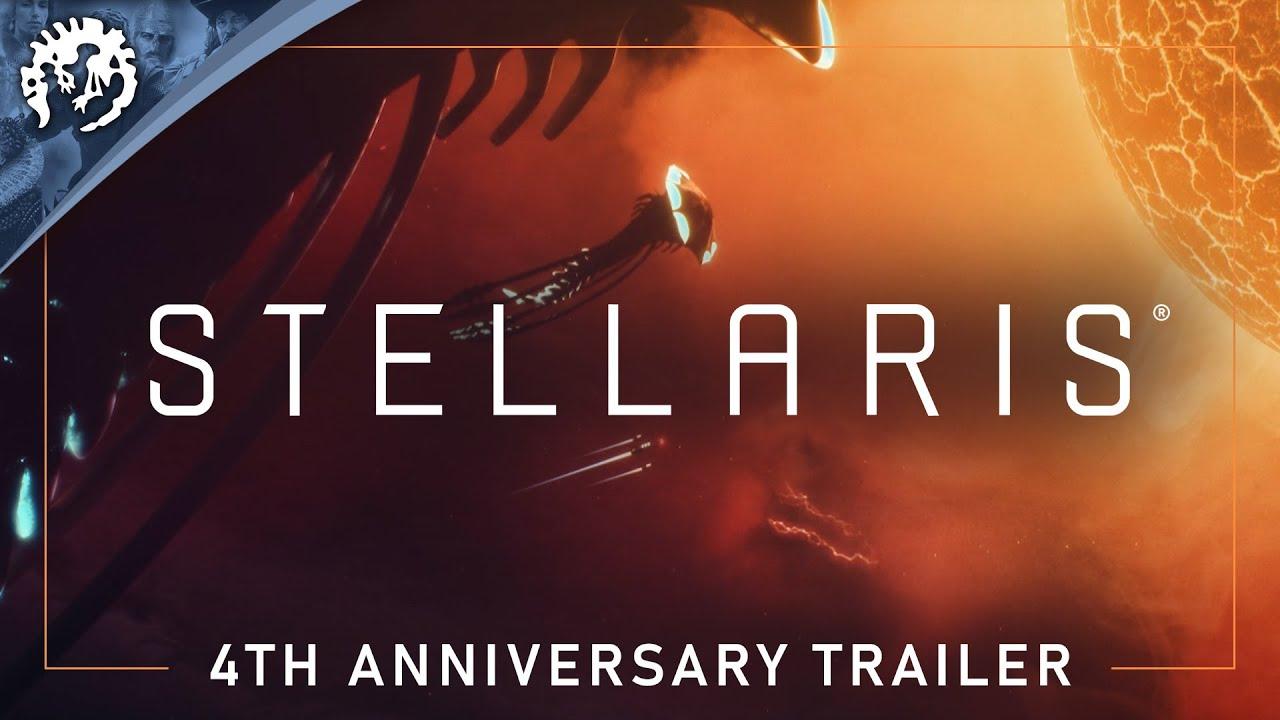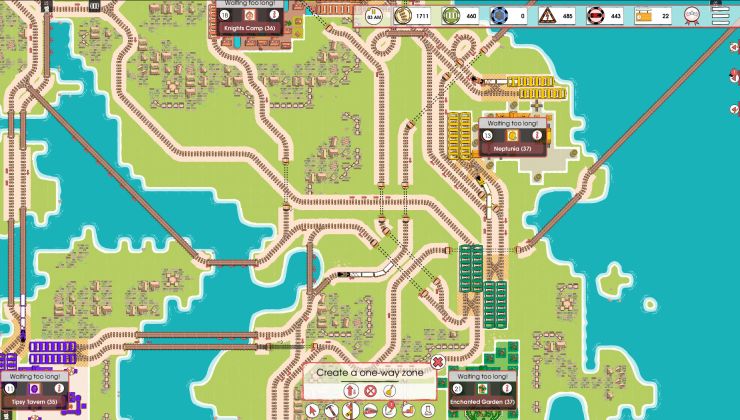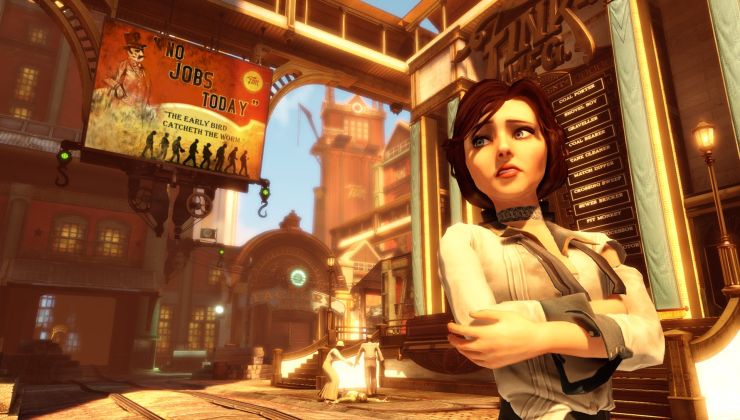Today Paradox Interactive and Paradox Development Studio have released the huge 2.7 'Wells' update for Stellaris, as it recently turned 4. Not only are the having a bit of an anniversary blow-out with it being 75% off, they're also allowing you to play it for free from now until May 17.
"We have always put the community first when developing and supporting content for Stellaris," said Daniel Moregård, Game Director for Stellaris. "It is so rewarding to see this strategy help us earn the continued interest of a large and growing player base after all these years. Being able to reach a new all-time high right now makes the anniversary festivities feel even more momentous."
Also announced today is that Stellaris has now officially hit an all-time high for "monthly active users" and it's now sold over three million copies making it quite a success. They also have a new trailer to celebrate:

Direct Link
The 2.7 update is huge too, overhauling tons of the game, especially visually. There's lots of new visual effects, new space-creature behaviour and a huge amount more that we wrote about recently. The full patch notes can be found here it's really great to see Paradox continue to push out such large free improvements for everyone. I'm looking forward to jumping back in to see it all!
Find Stellaris on Steam where it's 75% off and free to play until May 17 (around 8PM UTC it stops being free).
In related news, Paradox Interactive put out their financial report for Q1 2020 and it's looking like a very healthy business. Their revenue is up 68% when compared with Q1 2019 and they said it's mainly due to sales of Cities: Skylines, Europa Universalis IV, Hearts of Iron IV, Stellaris and Surviving the Aftermath.
I suspected it'll be on sale when I read the post about the new update. But didn't suspect it'll be free to try, so I went ahead and downloaded it. It's quite overwhelming when you start it. After a while when I got a bit accustomed to it I guess it's nice, but mostly two factors impact my enjoyment negatively: the overall slowness (research takes forever when compared to Master of Orion, for example) and the game not being turn based. Had this on my wishlist since it was released, but I'm sceptical I'd like it enough in the long term. :|
If you find the research rate to slow, then you can increase the research speed in new game setup; cant remeber the exact name but one of the many sliders will increase/decrease the tech rate.
I suspected it'll be on sale when I read the post about the new update. But didn't suspect it'll be free to try, so I went ahead and downloaded it. It's quite overwhelming when you start it. After a while when I got a bit accustomed to it I guess it's nice, but mostly two factors impact my enjoyment negatively: the overall slowness (research takes forever when compared to Master of Orion, for example) and the game not being turn based. Had this on my wishlist since it was released, but I'm sceptical I'd like it enough in the long term. :|
The issue with research speed is that the tech-tree is rather small. Already on normal research speed you run out of researchable technologies pretty early in the game (meaning: usually before end-game starts), unless you don't care about your administrative capacity.
(Actually, since you mentioned being a new player, you might not have seen this yet: Keep an eye on administrative capacity. If your empire sprawl exceeds it, your research will slow to a crawl. That _can_ be compensated by having lots of scientists, but since the Federations update it's probably easier to just get a bunch of bureaucrats to increase your administrative capacity instead.)
It not being turn-based is something that can be annoying in multiplayer, but in single player there's always the pause button to take your time.
(Some people might call the game turn-based, given that the smallest time unit of the game is one day. There are no fractional days. Also, if you pause, the game will always complete the current day first. However the player doesn't really see/notice this, it pretty much feels real-time.)
The whole real-time, not-turn-based thing weirded me out at first. But not any more; turns out it wasn't that I didn't like it, just that I wasn't used to it. Also, at the most basic level on that issue don't forget you can increase or decrease the speed. In the early game I think it would be kind of annoying if I couldn't push the speed faster.I suspected it'll be on sale when I read the post about the new update. But didn't suspect it'll be free to try, so I went ahead and downloaded it. It's quite overwhelming when you start it. After a while when I got a bit accustomed to it I guess it's nice, but mostly two factors impact my enjoyment negatively: the overall slowness (research takes forever when compared to Master of Orion, for example) and the game not being turn based. Had this on my wishlist since it was released, but I'm sceptical I'd like it enough in the long term. :|
The issue with research speed is that the tech-tree is rather small. Already on normal research speed you run out of researchable technologies pretty early in the game (meaning: usually before end-game starts), unless you don't care about your administrative capacity.
(Actually, since you mentioned being a new player, you might not have seen this yet: Keep an eye on administrative capacity. If your empire sprawl exceeds it, your research will slow to a crawl. That _can_ be compensated by having lots of scientists, but since the Federations update it's probably easier to just get a bunch of bureaucrats to increase your administrative capacity instead.)
It not being turn-based is something that can be annoying in multiplayer, but in single player there's always the pause button to take your time.
(Some people might call the game turn-based, given that the smallest time unit of the game is one day. There are no fractional days. Also, if you pause, the game will always complete the current day first. However the player doesn't really see/notice this, it pretty much feels real-time.)
I don't think the tech tree is that small; it's more that a whole game is really long. I just went straight from playing Master of Orion (the remake, "Conquer the Stars") to playing Stellaris, and the contrast drove it home: Stellaris is just a way bigger game--more complex, more sprawling, more eventful, deeper.
Last edited by Purple Library Guy on 13 May 2020 at 4:12 pm UTC
The thing I don't like about "real time with pause" is that sometimes I have to wait for quite some time before anything happens, then again things might happen several days in a row. With turn based I can focus on different tasks in a row (colony management, fleet management, relations, ...) and then get ready for the next turn. Here things happen in no particular order, often requiring me to react to them, so I'm often doing different small tasks, which I find somewhat tiring.
Also for a beginner it's hard to plan what you have to do when to get what you later need. For example the sprawl thing which I managed to grasp somewhat - planets grow so slowly you cannot react quickly to changing demands. To be fair I haven't played around a lot with the job system/prioritising/redistributing.
I'll give it some more time though. Just declared war for the first time to conquer a system that's sealing me off, only to find out that a single enemy star base has more military power than my largest fleet. :( So far I've only battled space monsters and a pirate fleet, and it cost's so damn much resources I can hardly imagine it's ever worth the cost going to war.
Thanks for your comments, I played some more and already got the feeling that a single game takes indeed very long. So research speed might be adequate, but progression still feels slow. Even on fastest speed, time does not pass that quickly. Don't know if it's limited by my machine.I wouldn't say I'm a good enough player to give tips, but . . . I will anyway. :D
The thing I don't like about "real time with pause" is that sometimes I have to wait for quite some time before anything happens, then again things might happen several days in a row. With turn based I can focus on different tasks in a row (colony management, fleet management, relations, ...) and then get ready for the next turn. Here things happen in no particular order, often requiring me to react to them, so I'm often doing different small tasks, which I find somewhat tiring.
Also for a beginner it's hard to plan what you have to do when to get what you later need. For example the sprawl thing which I managed to grasp somewhat - planets grow so slowly you cannot react quickly to changing demands. To be fair I haven't played around a lot with the job system/prioritising/redistributing.
I'll give it some more time though. Just declared war for the first time to conquer a system that's sealing me off, only to find out that a single enemy star base has more military power than my largest fleet. :( So far I've only battled space monsters and a pirate fleet, and it cost's so damn much resources I can hardly imagine it's ever worth the cost going to war.
First, yeah, in the early game I find I really don't want to spare resources for the navy because there's too much else I want to do. It's a problem. Worse of course is they cost to maintain. And they cost indirectly because I want to research strategic technologies--economy boosters, research speeders--but for a decent navy I gotta slow that down and research those weapons and stuff. But at some point you gotta, and it can be tricky to recognize the time when you need to bite the bullet and spend those resources and buy those techs. But that's not so different from MOO, really.
I always try to expand as fast as I can get Influence to make outposts with. Which also means any time I can get a perk which lets me get systems for less Influence, I take it. So like, I'm a big fan of the "Interstellar Dominion" ascension perk and the -10% Starbase Influence cost thingie from the Expansion tradition group. I tend to avoid treaties in the early game because they cost influence/turn meaning I expand slower. When borders are stabilized a few treaties might be worth something.
Pretty early on I'm working a few science ships for exploration in all directions and a couple of construction ships following along to grab the results. Exploring faster than you can take systems, you have a choice what to grab first, so skip low-resource systems that are side branches in favour of high-resource or stuff that takes you further out, past those potential bottlenecks.
When I'm a democracy I always give a big YES! when the factions show up and give me more influence, and I check to see if there's any policies I can tweak to pander to them so they'll be happy and make with the influence. I usually play democratic so I don't really know what vicious oppressors do for Influence.
In the early game IMO the place to get resources is space. Energy and minerals should come mostly from mining stations, not dirtside where you could be using your jobs for research or generating Unity or consumer goods or bureaucrats . . . or alloys for those ships.
Skip hard anomalies at the beginning when your scientists are low level; you can go back for them later. Researching a tough anomaly with a noob scientist takes so bloody long it can set back your exploration hard.







 How to set, change and reset your SteamOS / Steam Deck desktop sudo password
How to set, change and reset your SteamOS / Steam Deck desktop sudo password How to set up Decky Loader on Steam Deck / SteamOS for easy plugins
How to set up Decky Loader on Steam Deck / SteamOS for easy plugins
See more from me